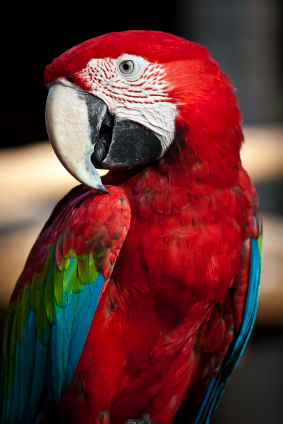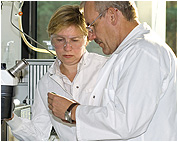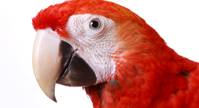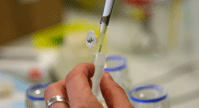Psittacine Herpesvirus (Pacheco's Disease)
Animal Genetics offers genetic testing for psittacine herpesvirus, the causitive agent for Pacheco's disease in parrots.
Description:
 Pacheco's disease is caused by a number of closely-related members of the Herpesviridae family of viruses. Herpesviruses are 120 to 220 nm in diameter and their genome has a double-stranded DNA structure. Replication of the virus occurs in the nucleus of a cell. These viruses primarily infect lymphatic tissue (B or T cells), skin (epithelial cells) and nerve cells (neurons).
Pacheco's disease is caused by a number of closely-related members of the Herpesviridae family of viruses. Herpesviruses are 120 to 220 nm in diameter and their genome has a double-stranded DNA structure. Replication of the virus occurs in the nucleus of a cell. These viruses primarily infect lymphatic tissue (B or T cells), skin (epithelial cells) and nerve cells (neurons).
Pacheco's Disease Virus (PDV) was first recognized in Brazil where aviculturalists began to see birds dying only a few days after becoming ill. The virus sheds in the feces and nasal discharge of an infected bird in as little as 3-7 days after infection. Considered highly contagious, Pacheco's can spread rapidly through an aviary. Often the first sign the disease is present is when a new bird is introduced to an aviary and healthy birds begin mysteriously dying. Pacheco's disease is often fatal and affects psittacines of all ages. New World psittacines seem to be more susceptible to the disease than Old World psittacines.
Transmission:
Transmission of PDV occurs generally through infected feces and nasal discharge. PDV remains remarkably stable outside the host body as a dust or aerosol. This dust or aerosol contaminates the air that is then inhaled by other possible hosts. Contaminated surfaces, food, and drinking water may also contribute to the spread of the disease.
As with many other viral diseases, vertical transmission from the mother to embryo is also possible.
Birds can be asymptomatic carriers of PDV. Some believe that any bird that has survived an outbreak of the disease should be considered a possible carrier. PDV can be re-activated when the bird is under stress such as during breeding, losing a mate, or a change in environmental surroundings. Once it is reactivated, the virus is shed in large numbers in the feces of the infected bird.
Symptoms:
Symptoms include lethargy, diarrhea, ruffled feathers, sinusitis, anorexia, conjunctivitis, and tremors in the neck, wings, and legs.
Fecal material may become discolored, with urates becoming green, indicating that possible liver damage has occurred. Birds generally die from massive liver necrosis characterized by an enlarged liver, spleen and kidneys. However, some birds die suddenly with no specific or visual symptoms.
Seemingly healthy birds often die quickly from Pacheco's disease. Stress associated with relocation, breeding, loss of mate or climate changes can activate the virus and result in activation of the disease and its symptoms, as well as shedding large numbers of the virus in the feces.
Diagnosis:
Diagnosis is confirmed by PCR testing for specific Avian Herpesvirus (AHV) DNA. Note: Results from PCR screening of birds for Pacheco's may be affected by the inconsistent shedding of the virus.
Some birds infected with the virus test positive, but never show clinical signs. Other birds which test positive may develop an immune response sufficient enough to fight off the infection and test negative after 30-90 days. Therefore, it is recommended to re-test all AHV positive birds 60-90 days after the initial testing was completed. If the second sample remains positive, the bird should be considered permanently infected and can be expected to show clinical symptoms of the disease as well as shed the virus.

Sample Type:
In live birds, please submit a cloacal swab and a blood card for each bird. Environmental testing can be done with swabs of aviaries, countertops, fans, air-filters, nest-boxes, etc. and is extremely effective when determining the presence of Pacheco's virus in the environment.
Limitations:
As with any genetic test new mutations may occur in the viral genome that could affect the assay. Therefore, it may be difficult to detect all subtypes. Sample collection plays a pivotal part in the overall accuracy of the test so please use caution and follow the instructions carefully.
Submit a Sample For Testing:
To submit a sample download a test submission form at Downloads
Cost per sample is $24.50. Please see our fee schedules below for bulk and combination rates.










